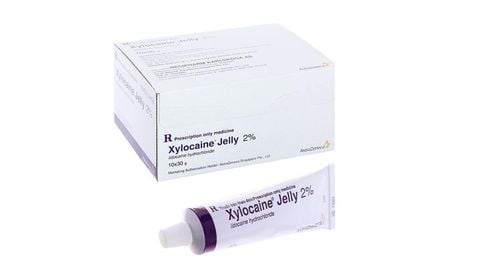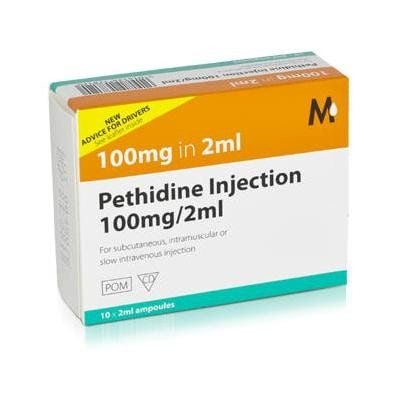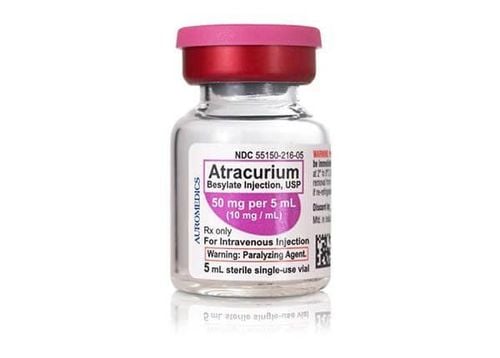This is an automatically translated article.
Vitaprox is an intravenous drug containing the ingredient Vecuronium. This is a class B toxic drug with muscle relaxant effect, mainly used in surgery.
1. What is Vitaprox?
Vitaprox contains the active ingredient Vecuronium bromide with a concentration of 4mg, the drug is prepared in the form of lyophilized powder for injection. In terms of pharmacodynamics, Vecuronium is an aminosteroid muscle relaxant with neuromuscular blocking effect (non-depolarizing), mainly indicated in surgery, anesthesia.
Regarding the pharmacokinetics, after intravenous administration of Vecuronium bromide, the drug is rapidly distributed in the body. Partially metabolized in the liver, some metabolites of Vecuronium have neuromuscular blocking activity.
Vecuronium is excreted in its unchanged form and metabolites, mainly via the biliary tract. A small percentage of the drug is eliminated by the kidneys. The mean half-life of Vecuronium is about 70 minutes.
2. What does Vitaprox do?
Vitaprox drug has a non-depolarizing neuromuscular block with a medium duration of action thanks to the active substance Vecuronium bromide and some of its metabolites. Vecuronium binds to cholinergic receptors on the posterior synaptic membrane, competitively blocking the conduction effect of ACh (acetylcholine) on the motor plate of skeletal muscle.
The muscle relaxant effect of Vecuronium bromide is about 1/3 times stronger than that of Pancuronium - a analogue of Vecuronium, however, the duration of action of Vecuronium is shorter than that of Pancuronium when administered at equivalent doses.
About 1.5 - 2 minutes after intravenous injection of Vitaprox with a dose of 0.08 - 0.10mg/kg (dose that completely relaxes muscle), most of the skeletal muscle system is relaxed at a perfect level, favorable for endotracheal intubation as well as facilitating any surgery. The duration of action of Vitaprox drug lasts from 20 to 30 minutes.
Vitaprox showed an advantage when not blocking ganglia, preventing depolarization in motor plates. Vecuronium bromide does not cause parasympathetic paralysis and has no adverse cardiovascular or respiratory effects. On the other hand, Vecuronium does not accumulate in the body, so multiple maintenance doses of Vecuronium can be administered consecutively at relatively evenly spaced safe intervals.
3. Indications of Vitaprox
Vitaprox (Vecuronium bromide) is mainly indicated in surgery to induce muscle relaxation, Vecuronium is significant after anesthesia by increasing the chest expansion during controlled or assisted respiration.
Vitaprox is also indicated to facilitate intubation.
4. Dosage and how to take Vitaprox
Use Vitaprox only when prescribed by your doctor. Vecuronium bromide is only used intravenously, not intramuscularly, with the following dosage and administration:
Intubation: Adults, children > 5 months: Vecuronium intravenous injection with an initial dose of 0, 08 - 0.1mg/kg, then maintain muscle relaxation 0.02 - 0.03mg/kg. Children <4 months of age: Vecuronium intravenously with a starting dose of 0.01 - 0.02mg/kg, followed by dose depending on response. Procedures after intubation with Succinylcholine: Adults and children >5 months old: 0.03 - 0.05mg/kg, then maintain at 0.02 - 0.03mg/kg. Neonates, children <4 months old: Initial dose 0.01 - 0.02mg/kg, then gradually increase to achieve effective. Muscle relaxant: Vecuronium intravenous infusion in adults with a starting dose of 0.04 - 0.1 mg/kg, then: 0.8 - 1.4 micrograms/kg/min.
5. Contraindications of Vitaprox
Vitaprox is contraindicated in patients with hypersensitivity to Vecuronium bromide or any of the excipients of the drug.
6. Side effects of the drug Vitaprox
Vecuronium bromide usually causes few side effects. Patients receiving Vecuronium, especially during prolonged use of Vecuronium to support mechanical ventilation in ICUs, may experience some undesirable effects of non-depolarizing muscle relaxants such as muscle atrophy, weakness and paralysis. Other side effects such as respiratory depression, apnea can also be seen with Vecuronium, but very rarely. Vecuronium can cause the release of histamine but weakly, the drug rarely causes anaphylaxis.
7. Vitaprox overdose and treatment instructions
Patients with an overdose of Vecuronium bromide will experience symptoms mainly an overrepresentation of the pharmacological effects of the drug.
Vitaprox overdose prolongs neuromuscular blockade compared to usual doses. Patients may present with symptoms such as muscle weakness, decreased respiratory reserve, and even stop breathing during surgery and anesthesia.
Management of Vecuronium overdose includes supportive treatment and symptomatic treatment:
Should set up monitoring to monitor. The patient needs to be maintained on ventilation. Perform assisted or controlled respiration until the patient is breathing spontaneously. It is necessary to treat cardiovascular support when indicated. The patient should be placed in an appropriate position and placed on an intravenous line. Use antihypertensive drugs when needed, if blood pressure drops sharply consider vasopressors (Adrenalin). Cholinesterase inhibitors can be used to reverse the neuromuscular blockade caused by Vecuronium (a muscle relaxant), most commonly Neostigmine, or Pyridostigmine, Edrophonium can be used.
8. Vitaprox drug interactions
Vecuronium increases potency when Vitaprox is combined with other non-depolarizing muscle relaxants, respiratory anesthetics, Suxamethonium, Aminoglycoside or Polypeptide antibiotics, Metronidazole, diuretics, alpha blockers, beta blockers, Thiamine (Vitamin B1), MAO inhibitors, Quinidine, Protamine.
Drugs that reduce the potency of Vecuronium can be mentioned as Neostigmine, Pyridostigmin, Edrophonium (removes the neuromuscular blockade of Vecuronium), in addition drugs such as Corticoids, Noradrenalin, Theophylline, Azathioprine, Calcium Chloride also reduces the potency of Vecuronium.
Incompatibility occurs when mixing Vecuronium with Thiopentone. Vecuronium should not be mixed with alkaline solutions such as barbiturates in the same syringe or administered simultaneously through the same intravenous route. Vecuronium should also not be mixed with other solutions or shared with syringes or infusion lines, unless solutions have been confirmed to be incompatible.
9. Precautions while taking Vitaprox
Patients with neuromuscular disease, severe myasthenia gravis, severe obesity, hepatobiliary disease, renal failure, impaired water-electrolyte balance, acidosis, Eaton-Lambert syndrome are the subjects to be noted. while taking Vitaprox.
Use of Vecuronium bromide in patients with severe myasthenia gravis, even small doses can produce profound effects. It is advisable to try very small doses (0.005 - 0.02 mg/kg) and closely monitor the response and adverse effects of Vecuronium in these patients. Vitaprox should be used with caution in patients with neuromuscular disease, severe obesity or after polio. Care should be taken to reduce the dose of Vecuronium in patients with hepatobiliary disease. Patients with mild renal impairment can still use Vecuronium. However, if kidney failure is severe, it may be better to use another muscle relaxant instead of Vecuronium. The neuromuscular blocking effect of Vecuronium is often prolonged for surgical hypothermia. Care should be taken and close monitoring is required in this case. Disorders of water-electrolyte balance such as dehydration, hypokalemia, hypocalcemia, hypermagnesaemia, hypoproteinemia or acidosis, and cachexia may also enhance the muscle relaxant effect of Vecuronium. Pregnancy: There is no evidence that the use of Vecuronium bromide in pregnant women can affect the mother's fertility or harm the unborn baby. The study results showed that it is safe to use Vecuronium bromide during cesarean section. Lactation: It is not known whether Vecuronium is distributed in breast milk, therefore Vitaprox should be used with caution in nursing women. Store Vecuronium bromide at a temperature of 15-30 degrees Celsius, protected from light. Do not mix Vecuronium with Thiopental or alkali because it causes precipitation. In summary, Vitaprox is an intravenous muscle relaxant, mainly used in surgery. Vitaprox is a prescription drug, so it should only be used under the direction and supervision of the treating doctor.













